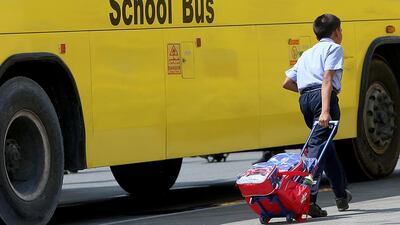In the past, Dr Abdulla Al Karam’s phone would ring off the hook at the start of each academic year with desperate parents pleading for help to find a place in a private school.
This year was different, the head of the Knowledge and Human Development Authority told an audience of private school leaders and operators gathered for the International and Private Schools Education Forum (IPSEF) in Dubai on Tuesday.
“This year I got phone calls, but not a single phone call was from parents trying to get me to tell a school to get their kid in that school. Nobody called to say, ‘can you make that happen,’ and I’m happy with that,” Dr Al Karam said.
“The market is stabilising and the first thing we get to see is that people have more choices, so there is no waiting or queuing.”
As the emirate’s private school sector has continued its rapid growth over the past five years, the burden has clearly shifted from parents scrambling to secure one of a limited number of seats for their children to schools having to come up with creative new ways of attracting new pupils.
Read more: Teachers told not to mock pupils in new UAE education code of conduct
Ten new private schools opened in Dubai this academic year. Fifteen opened the year before, and another 10 more are in the pipeline to launch next year. The emirate is now home to 283 international schools – including nurseries, primary and secondary schools – the most of any of city in the world, according to the latest data presented by Nalini Cook, head of Middle East research for ISC Research.
Madrid is a distant second, with 184 international schools. Abu Dhabi placed third, with 154. As a country, the UAE leads the world in the number of pupils enrolled in international schools – 604,983 – and is placed second behind China for the total number of private schools in the world, 601.
“We are in a very different situation than five years ago where you could open a school and you were guaranteed to have bottoms on seats and fill it regardless of what you were offering, in terms of curriculum, product, fee point,” said Ms Cook.
“The market is much more nuanced now. You need to be looking at the fee points, you need a unique selling point – there has to be something unique about your school.”
The increased competition has forced new schools to offer discounts to prospective students, while some established schools have begun to offer scholarships based on academic and economic merit. About 20 schools that were approved by the KHDA to raise their fees declined to do so, said Dr Al Karam.
________________
Education in UAE
UAE parents are the second highest education spenders globally
New investment avenues opening in the GCC’s education sector
UAE private schools to face greater scrutiny amid nationwide shake-up of education standards
________________
“You see more and more schools stabilising their price,” he said. “There will be some schools in the near future that will be dropping their prices. If they have not built the value for money, they will have to come down. We saw schools last year starting to give discounts and again this year giving more discounts. So that will come down to the point where there is actual value for money. But that takes time.”
Despite the increased competition, the education sector in Dubai is still “an attractive market,” for prospective investors, said Ashwin Assomull, managing director for Parthenon-EY, an education consulting firm.
“Which other market from anywhere around the world gives you double-digit growth in enrolments?” said Mr Assomull. “In the old days, I could start a super-premium school and it would fill up very, very quickly. Now you need to choose the right segment, the right curriculum, the right price-point for the right piece of land.”
Mr Assomull said it is likely that enrolment in the premium schools – those that charge the highest annual tuition fees – may slow down, while demand for low or moderately priced schools is high.
“Look at Gems, Gems has started schools at lower price points and filled them up very, very quickly because there is a demand at that segment,” said Mr Assomull, noting Gems Education’s Founders School in Dubai reached capacity with fees ranging between Dh22,000 and Dh29,000. When it first opened last year, Gems Founders School enrolled about 2,000 pupils, and this year it has already doubled in size.
Roland Hancock, PwC’s director for the education sector, said that it is critical for schools to listen to what parents want for their children.
“Your parents expect more of you today more than they’ve ever done,” Mr Hancock told the audience. “More is needed, and new approaches are required.”
More than anything, parents want choice, he said.
“There is an increasing gap in the market for high quality, mid-price schools,” he said.
“The challenge that schools have is to try and deliver the quality at that price, and generate the returns they need to survive. It’s the challenge that operators and investors face here.
"The intent, I think, is to give parents choice. It allows for competition, it allows for overall improvement, I see market dynamics which are a bit more mature than has been seen up to now in Dubai.”

